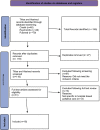Hospital-Based Palliative and End-of-Life Care in the COVID-19 Pandemic: A Scoping Review
- PMID: 34894772
- PMCID: PMC9386368
- DOI: 10.1177/10499091211057049
Hospital-Based Palliative and End-of-Life Care in the COVID-19 Pandemic: A Scoping Review
Abstract
Aim: To identify the nature of the evidence reporting hospital-based palliative and end-of-life care during the COVID-19 pandemic. Background: The COVID-19 pandemic has seen an increase in the numbers of seriously ill people being cared for across all health services worldwide. Due to the rapid progression of severe symptoms, the majority of staff working in hospitals and other healthcare centres were providing end-of-life care. Little is known about the level of hospital-based palliative care service provided during the COVID-19 pandemic, particularly during surges in admission rates with an increased number of deaths accruing. Methods: A scoping review was conducted to search and select potential studies. The scoping review was guided by the framework of Arskey and O'Malley and advanced by the use of the methodology of the Joanna Briggs Institute. Results: Eighteen studies published between March 2020 and July 2021 were identified. Three broad categories included overall management strategy and logistics, symptom prevalence and management of patients with COVID-19 and end-of-life care needs within the current pandemic. Conclusions: This review highlights increased awareness and knowledge of palliative and end-of-life care provided in hospitals. The review also highlights the response of hospital-based palliative care teams to an evolving crisis, within the context of developed health systems under sustained and overwhelming pressure. Implications: Newly established clinical links and referral pathways developed during the initial COVID-19 surge between hospital-based palliative care and other healthcare teams, be continued and further enhanced. Understanding of the role of specialist palliative care providers in supporting palliative and end-of-life care within the hospital setting needs further investigation.
Conflict of interest statement
References
-
- Armstrong R, Hall BJ, Doyle J, Waters E. ‘Scoping the scope’ of a cochrane review. J Public Health. 2011;33(1):147-150. - PubMed
-
- Arksey H, O'Malley L. Scoping studies: Towards a methodological framework. Int J Soc Res Methodol. 2005;8(1):19-32.
-
- Peters M, Godfrey C, McInerney P, Munn Z, Tricco AC, Khalil H. Chapter 11: Scoping reviews (2020 version). In: Aromataris E, Munn Z. eds. JBI Manual for Evidence Synthesis. JBI; 2020. 10.46658/JBIMES-20-12 - DOI
Publication types
MeSH terms
LinkOut - more resources
Full Text Sources
Medical


